Related Research Articles

Berkshire County is the westernmost county in the U.S. state of Massachusetts. As of the 2020 census, the population was 129,026. Its largest city and traditional county seat is Pittsfield. The county was founded in 1761. The Berkshire Hills are centered on Berkshire County. Residents are known as Berkshirites. It exists today only as a historical geographic region, and has no county government, with the exception of the retirement board for former county workers, and certain offices such as the sheriff and registry of deeds.
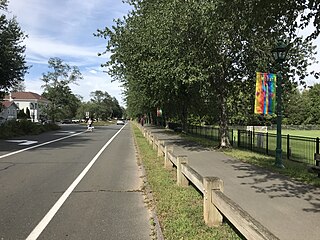
Simsbury is a town in Hartford County, Connecticut, United States, incorporated as Connecticut's 21st town in May 1670. The town is part of the Capitol Planning Region. The population was 24,517 in the 2020 census.
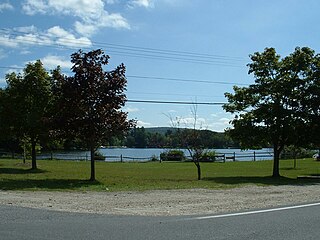
Monterey is a small town in Berkshire County, Massachusetts, United States. It is part of the Pittsfield, Massachusetts Metropolitan Statistical Area. The population was 1,095 at the 2020 census.
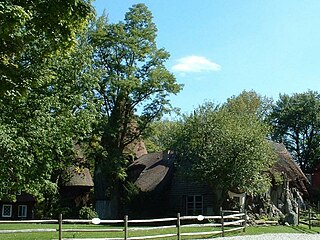
Tyringham is a town in Berkshire County, Massachusetts. It is part of the Pittsfield, Massachusetts Metropolitan Statistical Area. The population was 427 at the 2020 census.

Artemas Ward was an American major general in the American Revolutionary War and a Congressman from Massachusetts. He was considered an effective political leader, President John Adams describing him as "universally esteemed, beloved and confided in by his army and his country."

Aaron Burr Sr. was a notable Presbyterian minister and college educator in colonial America. He was a founder of the College of New Jersey and the father of Aaron Burr (1756–1836), the third vice president of the United States.
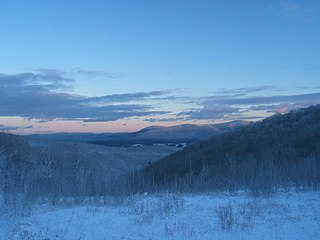
The Berkshires are a highland region located in western Massachusetts and northwestern Connecticut in the United States. Generally, "Berkshires" may refer to the range of hills in Massachusetts that lie between the Housatonic and Connecticut Rivers. Highlands of northwest Connecticut may be seen as part of the Berkshires and sometimes called the Northwest Hills or Litchfield Hills. The segment of the Taconic Mountains in Massachusetts is often considered a part of the Berkshires, although they are geologically separate and are a comparatively narrow range along New York's eastern border.
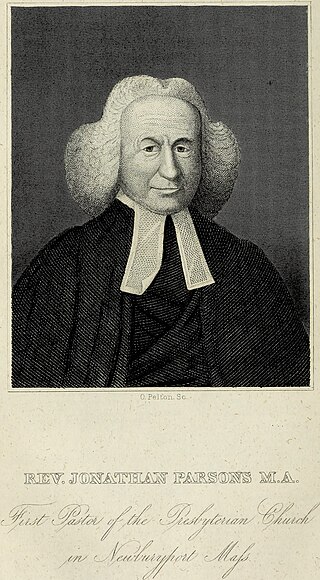
Jonathan Parsons was a Christian New England clergyman during the late colonial period and a supporter of the American Revolution. Born in West Springfield, Massachusetts, he was the youngest son of Ebenezer (Deacon) Parsons (1668-1752) and Margaret Marshfield of Springfield. Though intended for an artisan career, the Rev. Jonathan Edwards, then a tutor at Yale, persuaded young Parsons to prepare for college.

William Emerson was one of Boston's leading citizens, a liberal-minded Unitarian minister, pastor to Boston's First Church and founder of its Philosophical Society, Anthology Club, and Boston Athenaeum, and father to Ralph Waldo Emerson.
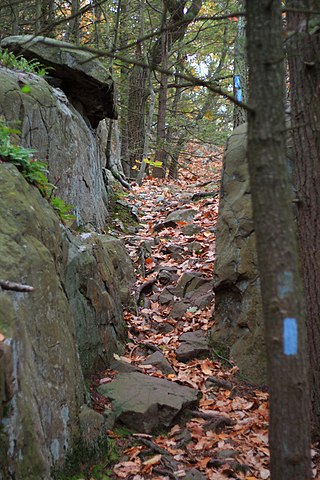
The Metacomet Trail is a 62.7-mile (100.9 km) Blue-Blazed hiking trail that traverses the Metacomet Ridge of central Connecticut and is a part of the newly designated New England National Scenic Trail. Despite being easily accessible and close to large population centers, the trail is considered remarkably rugged and scenic. The route includes many areas of unique ecologic, historic, and geologic interest. Notable features include waterfalls, dramatic cliff faces, woodlands, swamps, lakes, river flood plain, farmland, significant historic sites, and the summits of Talcott Mountain and the Hanging Hills. The Metacomet Trail is maintained largely through the efforts of the Connecticut Forest and Park Association.
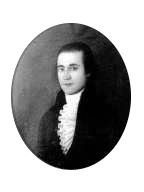
Barnabas Bidwell was an author, teacher and politician of the late 18th and early 19th centuries, active in Massachusetts and Upper Canada. Educated at Yale, he practised law in western Massachusetts and served as treasurer of Berkshire County. He served in the state legislature as representative and senator, as well as in the United States Congress as spokesman for the administration of Thomas Jefferson. He was effective in defending the administration's positions and passing important legislation. He resigned his seat in Congress in July 1807.
Nathan Webb, an early-American Congregational Church minister.
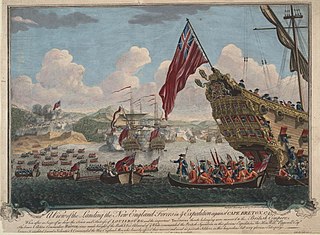
The siege of Louisbourg took place in 1745 when a New England colonial force aided by a British fleet captured Louisbourg, the capital of the French province of Île-Royale during the War of the Austrian Succession, known as King George's War in the British colonies.

Samuel Stillman (1737–1807) was an American Baptist minister. From 1765 until his death in 1807, Stillman served as pastor of Boston's First Baptist Church of Boston, Massachusetts; for these 42 years, Stillman was considered "the leading Baptist minister in New England, if not the United States." Stillman was an original trustee of Rhode Island College and played a leading role in the establishment of the Massachusetts Baptist Missionary Society in 1802.

The Bidwell House Museum is a historic house and museum on Art School Road in Monterey, Massachusetts, United States.
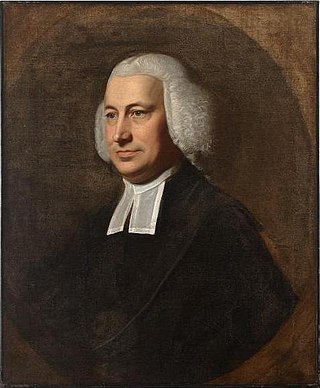
Samuel Cooper was a Congregational minister in Boston, Massachusetts, affiliated with the Brattle Street Church. He was born in Boston to William Cooper and Judith Sewall, attended the Boston Latin School, and was graduated from Harvard College in 1743. He was ordained as a minister on May 21, 1746, and served as pastor of the Brattle Street Church, 1747-1783. Members of his parish at the Brattle St. Church included some of the most influential people of the American Revolution: John Hancock, Samuel Adams, Joseph Warren, John Adams, and others. He corresponded with Benjamin Franklin, Charles Hector d'Estaing, Gideon Hawley, Charles Gravier de Vergennes; and was associated with Phillis Wheatley. In 1780, he co-founded the American Academy of Arts and Sciences. He served as "chaplain to the General Court" 1758-1770 and 1777-1783. Around 1783 Harvard College offered Cooper the position of college president, but Cooper declined. In September 1746 he married Judith Bulfinch; they had two daughters. A portrait of Cooper by John Singleton Copley now resides in the collection of the Massachusetts Historical Society.

Benjamin Simonds was a militia commander of Massachusetts during the French and Indian War and the American Revolutionary War. He was colonel of the all-Berkshire regiment of about five hundred men known as the “Berkshire Boys” during the American Revolutionary War. His regiment, the 2nd Berkshire County Regiment, notably fought in the Battle of Bennington in the summer of 1777.
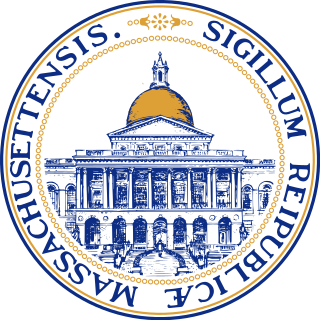
The 61st Massachusetts General Court, consisting of the Massachusetts Senate and the Massachusetts House of Representatives, met in 1840 during the governorship of Marcus Morton. Daniel P. King served as president of the Senate and Robert Charles Winthrop served as speaker of the House.
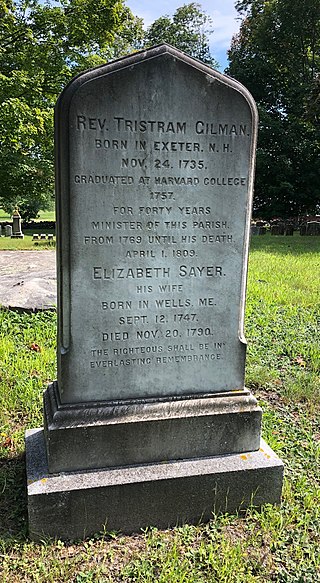
Tristram Gilman was an American Congregational minister who served as the fourth pastor of the "Old Ledge" meetinghouse in what was then North Yarmouth, Massachusetts, for forty years. Gilman Road, adjacent to where the church formerly stood, is now named for him.
References
- ↑ "18th Century Events and the Life of Adonijah Bidwell". Article first published in the Bidwell House Museum 2007 Newsletter. Archived from the original on 2008-05-11. Retrieved 2008-08-18.
- 1 2 3 4 Bidwell, Edwin M. (1884-01-01). Genealogy to the Seventh Generation of the Bidwell Family in America. J. Munsell's Sons.
- 1 2 3 4 5 6 7 8 Franklin B. Dexter, Biographical Sketches of Graduates of Yale College (New York, 1885), pp. 639-640
- ↑ Clute, Shirely S. "Bidwell's Saltbox House." Historical Journal of Massachusetts 21, no. 2 (1993): 23.
- ↑ Donovan, Ken. "Precontact and settlement: Ingonish and Northern Cape Breton from the Paleo-Indians to the 18th Century." The Nashwaak Review (2009): Vol 22-23. Issue 1
- ↑ Deepwood Manse Reported Sold, The North Adams Transcript (North Adams, MA) August 18, 1960, page 7, accessed January 8, 2017 at https://www.newspapers.com/clip/8246253/deepwood_manse_reported_sold_the_north/
- ↑ Terry, John Taylor. Rev. Edward Taylor, 1642-1720, The De Vinne Press, 1892
- 1 2 Joseph Edward Adams Smith, Thomas Cushing. Smith, Joseph Edward Adams, and Thomas Cushing, eds. History of Berkshire County, Massachusetts: With Biographical Sketches of its Prominent Men. Vol. 2. JB Beers & Company, 1885. p611
- 1 2 Dooley, John. History of the First Congregational Society in Monterey, Mass: With Brief History of the Town and Account of the Anniversary Exercises October 10 and 11, 1900, p 14-15. Courier Book and Job Press, 1900 (Monterey, MA) p611
- ↑ History of the Museum, The Bidwell House Museum, bidwellhousemuseum.org/index.php/history/
- ↑ Tyringham: Bidwell history talk on frontier pastor The Berkshire Eagle [Pittsfield, Mass] 22 June 2016.
- ↑ The War of American Independence, Select Bibliography, Colonial Wars: King George's War 1739-1748, history.army.mil